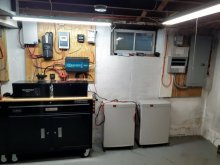jrosser1221
New Member
- Joined
- Sep 28, 2020
- Messages
- 1
Hey All,
I found Will's youtube, website and this forum last week, and have been trying to make a decision regarding backup power for my home. I live in Western Washington, and due to windstorms and trees being downed, we lose power every year. I have a gas furnace and water heater, and they have to be powered but draw extremely low voltage, as the electrical power just runs the panels and emergency switches. I could power just those with, say, a Duracell Powersource or some other small-ish backup system, but I do have a lot of interest in being able to power my refrigerator, but can't get myself to buy a massive gas generator to maintain and listen to and refuel.
So this is where I've found myself looking at solar systems. I also would love to have it for camping, events at parks, and "bug out" scenarios. I have the Delta 1300 in my Amazon cart with 3 of their proprietary panels, and have a couple of main questions, but would love feedback on any of this:
1. How feasible is it really for me to actually power a fridge for, say, a week, with this device? In the notoriously overcast Seattle Winter, am I likely to be able to keep it charged using solar power with so much draw? I don't know exactly how much power my fridge pulls (it's a newer GE double-door with chest freezer), but I did plug it in to my little 1050w gas generator, and the compressor wasn't able to fire. I'm having a hard time determining the feasibility of this plan.
2. Are there other semi-portable solar panels that you might recommend for use with the Delta 1300? Theirs look very nice, but they're $400. The Renogy 100w suitcase panels looks appealing; do I need the controller if I use it with the Delta or can I get just the panel?
Thanks for any insight.
I found Will's youtube, website and this forum last week, and have been trying to make a decision regarding backup power for my home. I live in Western Washington, and due to windstorms and trees being downed, we lose power every year. I have a gas furnace and water heater, and they have to be powered but draw extremely low voltage, as the electrical power just runs the panels and emergency switches. I could power just those with, say, a Duracell Powersource or some other small-ish backup system, but I do have a lot of interest in being able to power my refrigerator, but can't get myself to buy a massive gas generator to maintain and listen to and refuel.
So this is where I've found myself looking at solar systems. I also would love to have it for camping, events at parks, and "bug out" scenarios. I have the Delta 1300 in my Amazon cart with 3 of their proprietary panels, and have a couple of main questions, but would love feedback on any of this:
1. How feasible is it really for me to actually power a fridge for, say, a week, with this device? In the notoriously overcast Seattle Winter, am I likely to be able to keep it charged using solar power with so much draw? I don't know exactly how much power my fridge pulls (it's a newer GE double-door with chest freezer), but I did plug it in to my little 1050w gas generator, and the compressor wasn't able to fire. I'm having a hard time determining the feasibility of this plan.
2. Are there other semi-portable solar panels that you might recommend for use with the Delta 1300? Theirs look very nice, but they're $400. The Renogy 100w suitcase panels looks appealing; do I need the controller if I use it with the Delta or can I get just the panel?
Thanks for any insight.




